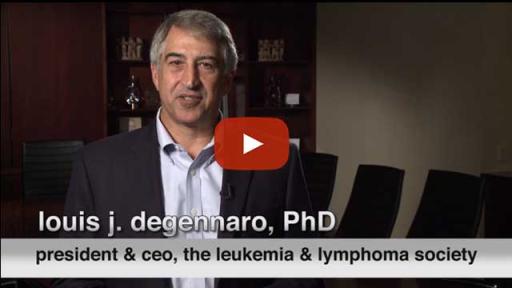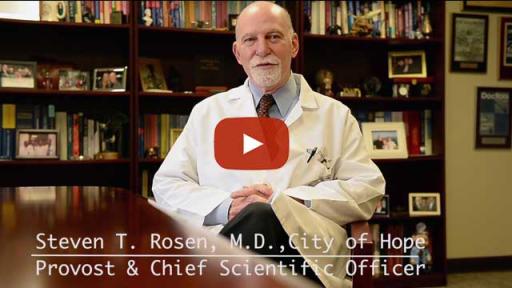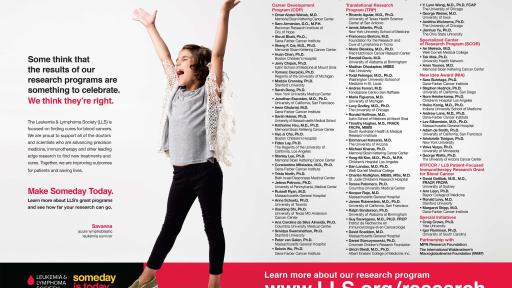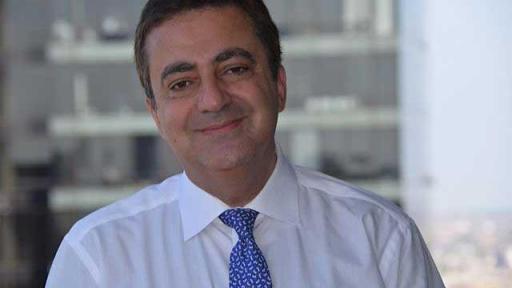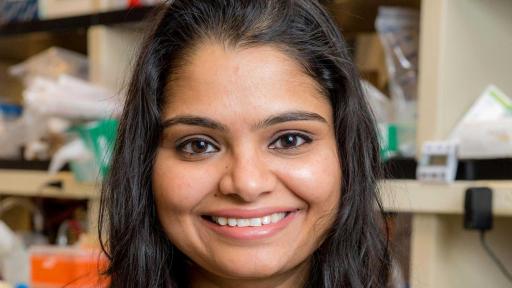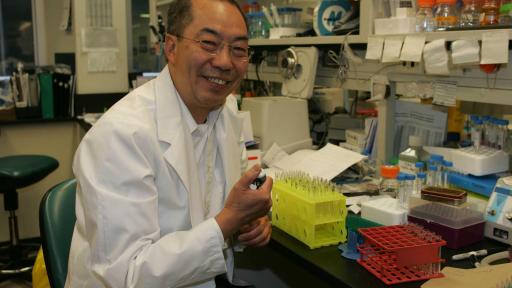World Leading Cancer Organization Invests $40.3 Million in New Research to Find Cures
The Leukemia & Lymphoma Society to Support Blood Cancer Research at Top Academic and Medical Centers Worldwide
PR Newswire – Rye Brook, NY – November 16, 2016
The Leukemia & Lymphoma Society (LLS) today announced it has committed $40.3 million in new research investments to advance the most promising blood cancer science at leading academic and medical centers around the world, including Dana-Farber Cancer Institute in Boston; Weill Cornell Medicine and Memorial Sloan Kettering Cancer Center in New York; MD Anderson Cancer Center in Houston; Fondazione Centro San Raffaele in Milan; and South Australian Health & Medical Research Institute in Adelaide.
This $40.3 million investment, comprised of 75 new research grants in LLS’s portfolio of 300 projects, will fund a diverse array of research to find better treatments and cures for patients with leukemia, lymphoma, myeloma and other blood cancers.
“LLS is leading the way by investing in cutting-edge research and clinical trials with the most promise of yielding cures and improving survival and the quality of life for blood cancer patients,” said Louis J. DeGennaro, Ph.D., LLS President and CEO. “In our 67-year history, we have invested more than $1 billion in research to advance breakthrough therapies and cures, and many of our successes in the blood cancers are now helping patients with other cancers and chronic diseases.”
LLS acts as a catalyst for collaboration among academic researchers, biotechnology companies and the government, to push the envelope on the newest research approaches, including immunotherapy and precision medicine. From bench to beside, LLS supports basic research to large-scale clinical trials, with the goal of accelerating treatments and cures to the 1.2 million people in the United States living with a blood cancer.
Following are the key areas of focus for LLS’s research grants:
Going On the Offensive against AML
This new investment comes on top of other major research initiatives underway at LLS, including the launch of its Beat AML Master Trial, a groundbreaking collaborative precision medicine clinical trial for patients with acute myeloid leukemia (AML). AML occurs in 20,000 new patients a year in the US, and is on the rise, associated with more than 10,000 deaths annually. This deadly aggressive disease has seen little change in standard of care in more than 40 years. The trial involves multiple treatment arms at multiple cancer centers and is employing advanced genomic technology to deliver investigational targeted therapies to patients more quickly.
The Master Trial is part of a multi-pronged approach LLS is taking as it leads the charge against AML, including:
Today, @LLSusa announced a $40.3 million investment in new research to find blood cancer cures! #SomedayIsToday Tweet
- Resistance to therapy. A commitment of $5.5 million to fund 11 new grants at academic centers to advance treatments for AML. Among these is one of three prestigious Specialized Center of Research (SCOR) grants LLS is awarding this year. A SCOR team led by Tak Mak, Ph.D., of University Health Network (UHN), Toronto, is studying the mutations that cause AML and lymphoma to understand resistance to therapy.
- Inherited Genetic Abnormality. A new collaboration with The Babich Family Foundation to invest $1.8 million to study an inherited genetic abnormality in a protein known as RUNX1, which increases a person’s risk of developing AML. Grants will be announced by July 2017.
- Starving the Cancer Cells. A new LLS Therapy Acceleration Program® (TAP) commitment to support The University of Texas MD Anderson Cancer Center’s clinical trial for a novel approach to treat AML by starving the AML cancer cells. The trial is underway.
Immunotherapy
LLS is investing more than $11 million in research to harness the power of the patient’s own immune system to kill cancer. For almost two decades, LLS has invested in immunotherapy on multiple fronts – from CAR-T to immune checkpoint inhibitors to cancer vaccines.
LLS is expanding its large commitment to a novel approach to CAR-T (chimeric antigen receptor) immunotherapy, in which the T-cells of patients with lymphoma are being genetically reprogrammed and reintroduced into the patient to find and attack cancer cells.
A SCOR led by Anas Younes, M.D., and colleagues, of Memorial Sloan Kettering Cancer Center, is designed to advance new generation CAR-T cells that contain activated T-cells and direct them to shut down the immune defense mechanisms of the blood cancer cell at the same time.
“For almost two decades, the standard therapy and cure rate of patients with diffuse large B cell lymphoma and follicular lymphoma has not significantly changed,” said Dr. Younes. “With the LLS SCOR grant, we have assembled a world-class science team to take advantage of the recent developments in immunotherapy to apply them to innovative treatment strategies for patients with lymphoma. Our goal is to change the standard of care and to improve treatment outcomes.”
LLS is also collaborating with the Rising Tide Foundation for Clinical Cancer Research to fund $2.4 million of translational research designed to further harness the immune system. Four $600,000 grants at Stanford University, Baylor College of Medicine, the Dana-Farber Cancer Institute and The University of Sydney (Australia) will apply a further understanding of the immune system to clinical trials that activate the immune system in leukemia and lymphoma patients.
Precision Medicine
The Beat AML Master Trial is making its mark as the first collaborative precision medicine trial in a blood cancer. The goal is to identify the mutations that drive the patient’s AML so the patient can be directed to the right treatment. Beyond this master trial, LLS is investing significantly in targeted therapy, getting the right treatment to the right patient at the right time.
Ari Melnick, M.D., of Sandra and Edward Meyer Cancer Center at Weill Cornell Medicine, is leading a third new SCOR team to study the molecular differences that make some lymphoma patients resistant to treatment with a goal of developing treatments that overcome resistance to chemotherapy or effective treatments that do not require chemotherapy.
Another such project led by Madhav Dhodapkar, M.D., of Yale University, will study targeted approaches to treat a rare blood cancer called monoclonal gammopathy of undetermined significance (MGUS), frequently a precursor to multiple myeloma, through a $600,000 Translational Research Program grant, a program that expedites promising research from the laboratory into treatments.
“It is an honor to receive this grant,” Dr. Dhodapkar said. “It will enable us to gain fundamental insights into how myeloma develops and explore new approaches to target it in the clinic.”
About The Leukemia & Lymphoma Society’s 2017 Research Portfolio
- Career Development Program (CDP). LLS is investing in today’s young scientists through the CDP, which awarded 26 new grants totaling nearly $7.4 million.
- Translational Research Program (TRP). LLS is expediting promising research from the laboratory into actual treatments through its TRP, which awarded 28 grants totaling nearly $17.5 million.
- Specialized Center of Research (SCOR). One of LLS’s most ambitious research programs, SCOR brings together leading scientists from multiple institutions and multiple disciplines to collaborate on solving the most challenging problems in blood cancers. This year, LLS awarded three grants totaling $12 million.
- New Idea Award. LLS funds innovative approaches that may fundamentally change the understanding, diagnosis and/or treatment of blood cancers and related pre-malignant conditions. This year, LLS awarded 10 grants totaling $750,000.
- Therapy Acceleration Program (TAP). LLS also invests approximately $10 million a year through its strategic TAP, with 17 projects currently in the pipeline, including new investments with Kiadis Pharma and MD Anderson Cancer Center. MD Anderson Cancer Center is working to advance a targeted approach to treat AML by starving the cancer cells.
- Other LLS Collaborators. LLS has significant collaborations with other organizations, including The Rising Tide Foundation for Clinical Cancer Research (RTFCCR), through which we are jointly supporting immunotherapy projects; The Babich Family Foundation, seeking to support research in the RUNX1 mutation in AML; The MPN (myeloproliferative neoplasms) Research Foundation and The International Waldenstrom’s Macroglobulinemia Foundation (IWMF).
About The Leukemia & Lymphoma Society
The Leukemia & Lymphoma Society® (LLS) is the world's largest voluntary health agency dedicated to blood cancer. The LLS mission: Cure leukemia, lymphoma, Hodgkin's disease and myeloma, and improve the quality of life of patients and their families. LLS funds lifesaving blood cancer research around the world, provides free information and support services, and is the voice for all blood cancer patients seeking access to quality, affordable, coordinated care.
Founded in 1949 and headquartered in Rye Brook, NY, LLS has chapters throughout the United States and Canada. To learn more, visit LLS.org. Patients should contact the Information Resource Center at (800) 955-4572, Monday through Friday, 9 a.m. to 9 p.m. ET.
To learn more about LLS’s new research investment visit our website at www.lls.org/research.
CONTACT: Andrea Greif, (914) 821-8958, [email protected]


